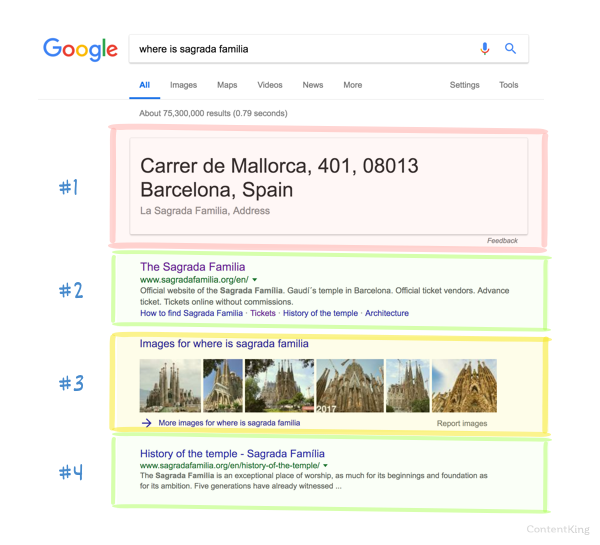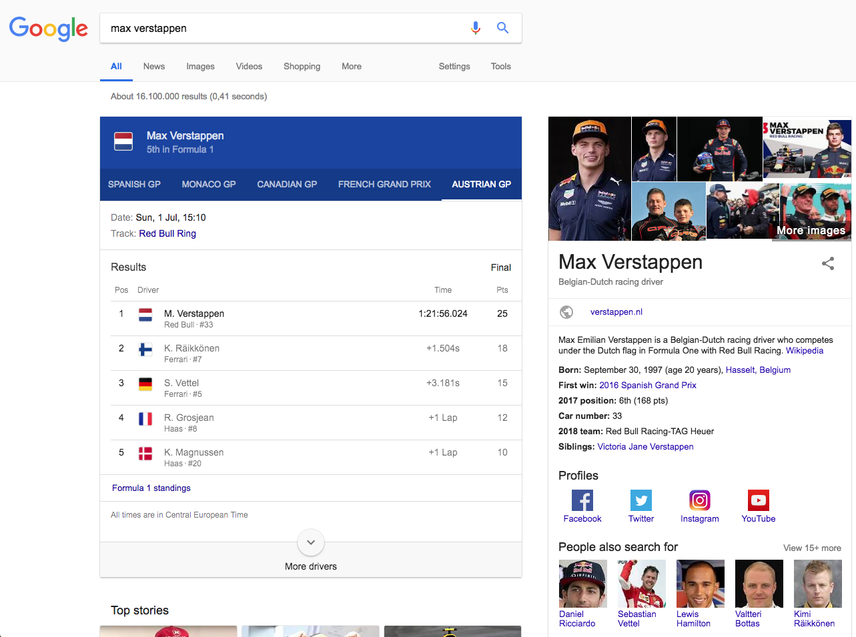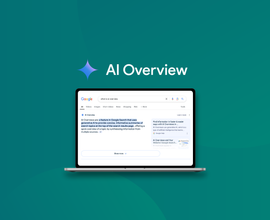The Best Rank Tracking Tools to Measure Your SEO Effort
Rank trackers allow you to monitor the effort you’re putting into SEO. With their help, you can keep track of the search engine positions your pages have for relevant search queries. Besides, rank tracking tools enable you to explore the performance of your competitors.
The most reliable rank trackers should provide you with these features:
- Search engine support
- Location support
- Device support
- Check frequency
Among SEOs, what rank tracking tool to use is a much discussed topic.
In this article we take a deep dive into features you should be looking for in a rank tracker. If you want to save time, you can go ahead and skip this article and check out our own rank tracking solution.
Still with us? Alright then, moving on — in this article we explain what rank tracking is, why it's important for SEO, what to look out for when choosing the right rank tracking tool ("rank tracker" for short) and our recommendations on rank trackers.
What is rank tracking?
Rank tracking is the process of keeping track of what positions your pages have in search engines for the search queries you're interested in. A rank tracker is an application that does rank tracking.
Why is rank tracking important?
It's important to measure the result of the effort you're putting into SEO. Keeping track of your rankingsRankings
Rankings in SEO refers to a website’s position in the search engine results page.
Learn more plays an important part in that.
Just typing in queries yourself and checking where your pages come up doesn't paint a realistic picture. Actually, it's the worst way to check rankings, as search engines serve you personalized search engineSearch Engine
A search engine is a website through which users can search internet content.
Learn more result pages (SERPs). If you often click on domain A, they're likely to list that domain a lot higher than other results for just you.
What about checking it in an Incognito window?
Also manually checking your rankings in an Incognito window doesn't work as the search queries are still made from your IP address, with an extensive search history that search engines have meticulously kept track of.
How does a rank tracker work?
Rank trackers rely on servers that simulate user queries. These simulated user queries are often made in an incognito window in a session without a biased search history. After a user query is "performed", they scrape the resulting SERP and save the listings.
Important rank tracker features
In order to help you choose the right rank tracker for you, we need to understand what rank tracking features you need to take into account.
These are the basic features of any rank tracker:
- Search engine support
- Location support
- Device support
- Check frequency
Search engine support
Google has by far the largest market share in the search engine market, but it's certainly not the only search engine on the market.
Depending on your location, it may not even be your primary search engine.
Other search engines:
- Bing
- Yahoo
- Baidu (primary market: China)
- Seznam (primary market: Czech Republic)
- DuckDuckGo
Location support
The physical location of a user plays a huge role in the SERP that's returned by search engines.
Example: when a user in Amsterdam searches for "italian pizza", he's going to see snippets from pizza places in and near Amsterdam.
It also works on a national level, if a user in France searches for "mortgage" he's going to see mixed results: local mortgage shops, general information on mortgages and British mortgage providers.
Rank trackers generally support defining locations on these levels:
- Country
- Province/State
- City
Sometimes, it's even possible to define zip code level.
Please note there are multiple ways to Google with a location parameter. The most natural one is to let Google use your physical location. The other - most commonly used by rank trackers - is by manually defining your location. It's unclear if Google would serve the act same search results in both cases.
Check frequency: you need daily rank tracking
The frequency with which rank trackers check your positions is an important feature to consider. We recommend letting rank trackers check your rankings on a daily basis because it gives you:
- The level of detail you need to be able to quickly act when you see a huge drop.
- Vital insight in the development of your rankings. This is useful for being able to connect increased or decreased rankings to for instance Google updates.
Not all rank trackers support checking rankings daily, they may only support checking weekly or monthly.
Please note that some rank trackers even support live updating the rankings upon request.
Device support: don't forget mobile rank tracking
Users query search engines using a wide range of devices. Broadly speaking, we distinguish between desktop and mobile searches.
You'll see that the same query performed on desktop and mobile produces different results. Why? Because some websites may not be optimized for mobile users, while others were designed specifically for mobile users. The idea is that websites that don't perform well on mobile, will rank lower for users searching on mobile.
With this in mind, it's important to be able to check your rankings for both desktop and mobile devices. As this is a relatively new development, not yet all rank trackers support this so be mindful of that.
Amount of results checked
How many results does the rank tracker process? Oftentimes you'll see they range between 30-100 resuls.
SERP features

A couple of years ago, you'd only see news, maps, image and video snippets besides regular snippets.
Over the years, search engines have added a variety of new snippets among which:
- Enhanced snippets
- Direct answer boxes
- Tweets
- Knowledge graph cards
It's important to be able to track what types of SERP features are shown for your search queries. You may have a first position locked down for your money keywords, but it could be overshadowed with a huge time table.
Try searching for "max verstappen " for instance:

Ranking history already available
Some rank trackers support retrieving historical ranking data for domains you're newly adding. That's actually very clever: when retrieving the rankings for site A, they also save the rankings of the other 99 sites in the top 100. When you're adding new domains, they'll search through this data to see if they've got historical rankings for it.
Competitor rank tracker
Being able to keep track of how the competitionCompetition
Businesses generally know who their competitors are on the open market. But are they the same companies you need to fight to get the best placement for your website? Not necessarily!
Learn more is doing in terms of SEO is important. Keeping track of their rankings is often supported by rank trackers. They'll let you select a few competitors when you're setting up rank tracking for your keywords.
Reports and alerts
While your rank tracker gathers fresh ranking data daily, there's no point in checking all of your rankings every day. Daily ranking updates are very useful to detect patterns, for seeing the bigger picture.
Therefore, it's nice to be able to rely on weekly/daily ranking summary reports and real-time alerts in case a significant ranking drop is detected. Please note we have a handy 13-step process for diagnosing that ranking drop.
Grouping queries
Categorizing queries is the way to turn your ranking data into ranking information. If you're keeping track of hundreds, if not, thousands of queries you can't see the forest through the trees anymore. Therefore, it's essential to categorize related queries. Often the same pages, or very similar pages are ranking for these queries.
Doing so enables you:
- To think in terms of clusters of related queries (similar to search engines).
- To look at the bigger picture as it enables you to calculate average positions and index scores across a query category.
Sharable link
Some rank trackers support sharing ranking reports via a sharable link. Why this is useful? If you want a quick and easy way to share your rankings, without giving access to your rank tracker. Common use cases are to report to clients, or different departments.
White-labeling and API integration
Agencies often use a client-portal where they have one centralized place for their clients to find all of their reports, deliverables, communication and invoices. Including ever up-to-date ranking reports in there makes sense as well.
Rank trackers often have APIs available that let you pull your ranking data.
What are the limitations of rank trackers?
Google uses a lot of factors that determine what search results to return to what users. If we're both searching for the same query there's a big chance we're seeing different results.
What does this mean for rank trackers? Well, there is no such thing as "one truth" when it comes to reporting on rankings. Keep that in mind.
Happy rank tracking!
Frequently asked questions about rank trackers
1. Why is rank tracking important for SEO?
Rank Trackers allow you to monitor your website's positions for important search queries in search engines. This way you can evaluate your SEO effort and see which pages require more improvements. Similarly, it allows you to monitor your competitors' performance, giving you the opportunity to outperform them.
2. What are the best rank tracker tools?
The best rank tracking tools have to be optimized for all search engines and devices. They should provide information about the search location and daily tracking. We recommend using Conductor.
3. Are there any free rank trackers?
There are free rank tracking tools available, however, they are useful mostly for small businesses that need to keep track of a small batch of keywords.







